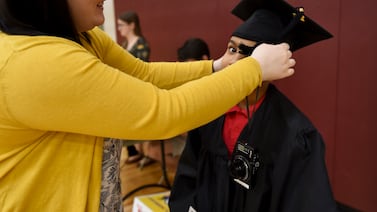The personalized education plans that spell out how a school intends to support a student with a disability can run dozens of pages and be full of technical language.
And in many Colorado school districts, parents who speak a language other than English don’t see a copy of their child’s plan in the language they understand best until they’re being asked to sign a legally binding final version.
A bill in the Colorado legislature would change that, requiring that final education plans be translated, as also required by federal law, and allowing parents to request draft documents in their preferred language. A separate school finance bill would allocate $500,000 to offset school district costs for translating more documents.
By law, parents are a part of the team that comes up with each student’s educational plan — known as an IEP or individualized education program — alongside teachers and other school professionals. And federal law requires that the final version of an IEP be translated into a language parents can understand.
But community organizers and parent advocates said that’s too late in the process for parents to play their role effectively. Parents need to be able to understand draft documents and information from assessments so they can ask questions and provide feedback to the teachers who work with their children, they said.
“Non-English-speaking parents are signing legal documents that they cannot understand and are not able to participate in the decision-making process to support their children,” said Natalia Alvarez, an organizer with the Colorado Statewide Parent Coalition who has worked with Spanish-speaking parents in the Boulder Valley School District to secure more translation.
Bri Buentello, director of government affairs for the advocacy group Stand for Children, is a former special education teacher. She said hearing from parents was a critical part of the IEP process, in particular for students with autism. Parents could provide valuable information about what works and what doesn’t for their child, and parents and teachers could work together to support a student’s learning and behavior.
“An IEP isn’t a good IEP unless the parents are providing their input,” Buentello said.
House Bill 1263 received broad bipartisan support in both chambers.
Democratic state Reps. Lorena Garcia and Mary Young are sponsoring the bill. Garcia also serves as the chief executive officer of the Colorado Statewide Parent Coalition. Young is a retired special education teacher.
In the Boulder Valley district, officials already are doing a phased rollout of expanded translation services for IEP meetings. Special Education Director Michelle Brenner said the district previously offered oral translation of the main points in an education plan but didn’t provide written translation of draft IEPs or assessments of students’ skills and challenges.
School staff were responsible for calling interpreters off an approved list, and sometimes that task fell through the cracks.
After hearing over a period of years from parents and advocates that many parents felt like they couldn’t participate meaningfully in IEP meetings, the school district revamped its process, starting with three bilingual schools and then expanding to all the schools in Lafayette, where there’s a larger concentration of Spanish-speaking families.
“Even though we met the rules and the letter of the law, hearing that our families could not meaningfully participate, we wanted to do something about it,” Brenner said.
Don McGinnis, manager of translation and interpretation services for the district, said this meant centralizing the request system so that it just takes a few seconds for school staff to make a request, changing timelines to make sure documents can be translated and proofread with care, and developing large databases of appropriate terminology and legal language in Spanish.
“Removing those barriers means schools are using the services more, and parents feel more comfortable asking for them,” McGinnis said.
Where the district once spent $35,000 a year on IEP-related translation and interpretation services, it expects to spend more than $100,000 this year and possibly more going forward, as the service expands to all schools.
The district also has conducted training for teachers to improve communication with parents and sought out parent feedback on how the new system is working. Expanded services are new this year, but anecdotally, Brenner said, schools are making more requests for translation and interpretation, including more requests for interpretation for phone calls between teachers and parents.
McGinnis encouraged any district looking to expand translation of special education documents to meet with parents and ask them what they need.
“They need to figure out face to face what needs are not being met,” he said.
Bureau Chief Erica Meltzer covers education policy and politics and oversees Chalkbeat Colorado’s education coverage. Contact Erica at emeltzer@chalkbeat.org.






